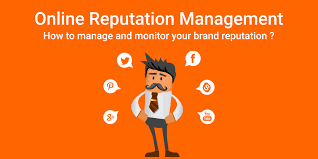Mastering Online Brand Reputation Management: Strategies for Success in the Digital Age
The Importance of Online Brand Reputation Management
In today’s digital age, a company’s online brand reputation can make or break its success. With the vast amount of information available on the internet, consumers have the power to research and form opinions about a brand with just a few clicks.
Online brand reputation management is the practice of monitoring, influencing, and maintaining a positive perception of a brand across various online platforms. It involves managing customer reviews, social media presence, search engine results, and other online content that can impact how a brand is perceived by the public.
Why is Online Brand Reputation Management Important?
A strong online brand reputation can build trust with consumers, attract new customers, and differentiate a brand from its competitors. On the other hand, negative reviews or damaging content can tarnish a brand’s image and drive potential customers away.
By actively managing their online reputation, companies can respond to feedback in a timely manner, address customer concerns effectively, and showcase their commitment to customer satisfaction. This proactive approach not only helps in resolving issues but also demonstrates transparency and accountability.
Best Practices for Online Brand Reputation Management
- Monitor Online Mentions: Regularly monitor social media channels, review sites, forums, and search engine results to stay informed about what people are saying about your brand.
- Engage with Customers: Respond promptly to customer reviews and feedback, whether positive or negative. Show appreciation for positive comments and address concerns respectfully.
- Create High-Quality Content: Publish engaging and informative content that showcases your expertise and values. This can help build credibility and establish your brand as an authority in your industry.
- Optimise SEO: Implement search engine optimization (SEO) strategies to ensure that positive content ranks higher in search results than negative content.
- Maintain Consistency: Ensure that your branding elements are consistent across all online platforms to create a cohesive brand image.
The Bottom Line
Effective online brand reputation management is essential for maintaining a positive image in the eyes of consumers. By proactively managing their online presence and engaging with their audience, companies can build trust, loyalty, and credibility that ultimately contribute to long-term success.
Essential FAQs for Managing and Enhancing Your Brand’s Online Reputation
- How can I monitor my brand’s online reputation?
- What are the best strategies for responding to negative reviews online?
- How important is social media in managing a brand’s reputation online?
- What tools or platforms can help with online brand reputation management?
- How can I improve my brand’s search engine results to enhance its online reputation?
How can I monitor my brand’s online reputation?
Monitoring your brand’s online reputation is crucial in today’s digital landscape. To effectively track how your brand is perceived online, you can employ various strategies. Utilize social media listening tools to monitor mentions of your brand across different platforms. Set up Google Alerts to receive notifications whenever your brand name is mentioned on websites or news articles. Regularly check review sites and forums for feedback from customers. Monitoring online conversations about your brand allows you to stay informed, address any issues promptly, and maintain a positive image in the eyes of consumers.
What are the best strategies for responding to negative reviews online?
When it comes to responding to negative reviews online, the best strategies involve a proactive and empathetic approach. Firstly, it is crucial to respond promptly to negative reviews to show that you value customer feedback and are committed to addressing concerns. Acknowledge the issue raised by the customer and apologise if necessary, demonstrating empathy and understanding. Offer a solution or steps to rectify the situation, showing that you are willing to make things right. Encourage further communication offline to resolve the issue privately and showcase your dedication to customer satisfaction. By handling negative reviews with transparency, professionalism, and a genuine desire to improve, businesses can turn a potentially damaging situation into an opportunity to showcase their commitment to excellent customer service.
How important is social media in managing a brand’s reputation online?
Social media plays a crucial role in managing a brand’s reputation online. With millions of users actively engaging on platforms like Facebook, Twitter, Instagram, and LinkedIn, social media has become a powerful tool for brands to connect with their audience and shape public perception. By monitoring conversations, responding to feedback, and sharing valuable content, companies can effectively manage their online reputation on social media. Positive interactions can enhance brand credibility, build trust with consumers, and foster loyalty. Conversely, neglecting social media presence or mishandling negative feedback can result in reputational damage. Therefore, leveraging social media as part of a comprehensive online brand reputation management strategy is essential for businesses looking to maintain a positive image and stay competitive in today’s digital landscape.
What tools or platforms can help with online brand reputation management?
When it comes to online brand reputation management, there are several tools and platforms available to help businesses monitor and enhance their online presence. Social media monitoring tools such as Hootsuite, Sprout Social, and Brandwatch allow companies to track mentions, comments, and conversations about their brand across various social media platforms. Online review management platforms like Trustpilot, Google My Business, and Yelp enable businesses to manage customer reviews effectively and respond to feedback in a timely manner. Additionally, search engine optimization (SEO) tools like SEMrush and Moz can help companies improve their search engine rankings and ensure that positive content ranks higher than negative content in search results. By leveraging these tools and platforms, businesses can proactively manage their online brand reputation and maintain a positive image in the digital landscape.
How can I improve my brand’s search engine results to enhance its online reputation?
To improve your brand’s search engine results and enhance its online reputation, it is essential to focus on search engine optimization (SEO) strategies. Start by conducting keyword research to identify relevant terms that potential customers may use to search for your brand. Incorporate these keywords into your website content, meta tags, and other online assets to improve your visibility in search engine results. Additionally, create high-quality, engaging content that provides value to your audience and encourages organic sharing and linking. Regularly monitor your search engine rankings and make adjustments as needed to ensure that positive content ranks higher than any negative mentions. By implementing effective SEO practices, you can strengthen your brand’s online presence and reputation.




